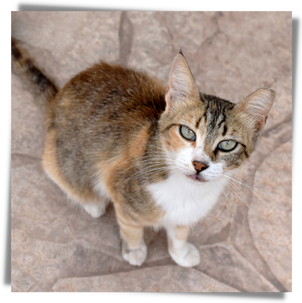If the cat is truly feral, do not attempt to handle him or her. You risk serious injury to yourself and/or to the cat if you attempt to handle a feral cat. Follow the instructions below to care for cats that you cannot handle.
|
Post-operative care for community (feral/stray) cats depends on whether you can handle the cat. If you can handle the cat, please follow the standard care described on our Post-Operative Care instructions. The cat’s stitches will dissolve, so you do not need to bring them back to the clinic to have stitches removed.
Note: It is very important that you release feral cats in the same location where you trapped them. Feral cats generally do not do well if they are relocated. If you must relocate feral cats, reference Alley Cat Allies for more information on the proper way to do this (www.alleycat.org). |
Male cats can generally be released the afternoon following surgery (that is, the afternoon of the day you pick them up from The PAWS Clinic). In extreme cold or wet weather, please keep the cat additional nights if possible, until the weather clears, following the instructions below.
Female cats should be kept at least 48 hours post-surgery (one more night after you pick them up from The PAWS Clinic) if at all possible. If the cat was pregnant, keeping her for 72 hours post-surgery is advantageous for her recovery. In extreme cold or wet weather, please keep the cat additional nights if possible. However, if clinic staff tells you that she was likely nursing kittens, you should release her immediately. She still will be able to nurse her kittens after surgery.
Feral cats are easily stressed, and the experience of having surgery is very stressful. To minimize additional stress during recovery, make sure to follow these discharge instructions fully.
Thank you for making a difference in the cat overpopulation problem. Not only have you prevented the birth of unwanted litters of kittens, but you’ve helped this cat lead a healthier life.
Female cats should be kept at least 48 hours post-surgery (one more night after you pick them up from The PAWS Clinic) if at all possible. If the cat was pregnant, keeping her for 72 hours post-surgery is advantageous for her recovery. In extreme cold or wet weather, please keep the cat additional nights if possible. However, if clinic staff tells you that she was likely nursing kittens, you should release her immediately. She still will be able to nurse her kittens after surgery.
Feral cats are easily stressed, and the experience of having surgery is very stressful. To minimize additional stress during recovery, make sure to follow these discharge instructions fully.
- Cats should remain in the live trap during the recovery period. Do not attempt to transfer a feral cat to a carrier or cage. Cats are very quick and can easily escape during transfer. Transferring the cats from the traps also risks injury to you and/or the cat.
- Please keep the cat in a temperature controlled, draft-free environment during their recovery. At the very least, please keep them in a sheltered area (for example, a garage or shed) out of the elements.
- Keep their traps covered at all times. This provides protection and security. Keep the trap lined underneath with newspaper to keep the cat clean and dry.
- Offer food and water when you get home, but be careful opening the trap to slip food and water in. If possible, use a trap fork to hold the cat on one side of the trap while you provide food and water and clean newspaper. Forks are available for rent at The PAWS Clinic. For your safety, do not attempt to touch the cats.
- Abnormal signs that will need attention by veterinary staff during the recovery include any bleeding or discharge coming from the surgery site, abnormal smells, biting/chewing at incision site, and continued lethargy (not feeling well).
- If you have any concerns about the recovery of the cat, please call us at 313-451-8200. Please leave a message if we do not answer, and we will call you back promptly.
Thank you for making a difference in the cat overpopulation problem. Not only have you prevented the birth of unwanted litters of kittens, but you’ve helped this cat lead a healthier life.

